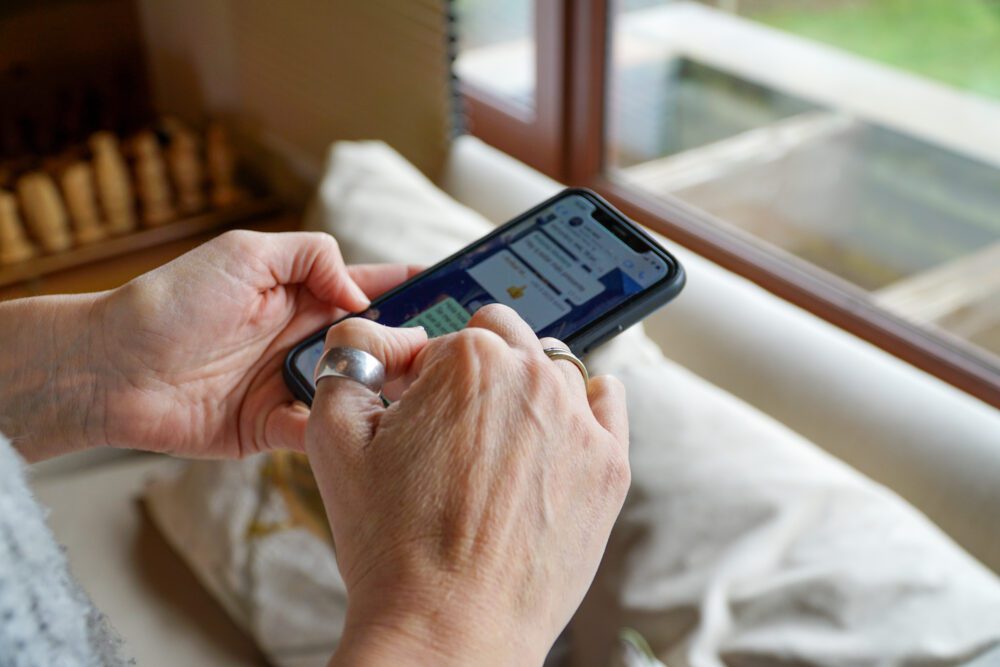Every year, billions of pounds are lost due to fraud and the impact can be devastating. As the most common type of crime, BBC Sounds has investigated five common ways fraudsters target victims.
BBC Radio 4’s Shari Vahl has been investigating fraudsters and how to get victims’ money back. In a five-part series, along with ex-fraudster and poacher-turned-gamekeeper Alex Wood and linguistics expert Elisabeth Carter, Shari shares five real-life fraud stories about how easy it is to be scammed and what you must do to prevent being a victim.
We summarise the five cases investigated and the most common types of fraud:
1. Love
+ −Scammers can gain the trust of their victims online through social media and dating apps like Tinder, Hinge, Match and Bumble, then persuade them to send money. Romance scams are a very common type of fraud, but in this story, a sophisticated scam unfolded.
Kirsty, 41 at the time and recently divorced with four children under nine, started online dating based on recommendations from her friends. She began messaging a man with dark hair, blue eyes, and a British accent. They connected well and moved on to talking on the phone. He travelled for work, and during one trip to Turkey, he sent her a video of himself at the airport. That was the last Kirsty heard from him.
After three days, he sent a message informing her that he was in the hospital following a car hijacking. He had been beaten up, and his wallet and phone were stolen. Unable to pay his hospital bill, he asked Kirsty to log in to his account to transfer money for the payment. Kirsty did as she was asked and later paid a couple of other bills for him. When he requested help a third time, the account was locked out with an “invalid IP address” message. The man became angry with Kirsty, and she started to feel guilty.
Following the account lockout, he claimed that he needed to pay his hotel bill and asked Kirsty if she could send him money. Kirsty wanted to help and sent the requested funds, which eventually amounted to £27,000. It wasn’t until she arranged to meet him at the airport, and he didn’t show up, that she realised she had been scammed. Her family had taken out loans to help, and the situation ultimately cost them around £80,000. Kirsty’s sister later found photos of the man online and discovered that the images and online dating profile were fake.
Linguistics expert Elisabeth Carter explains that fraudsters often use specific types of language to isolate and groom their victims. This in turn highlights why talking to friends and family and seeking their opinions is crucial to avoid sending money in such situations as victims frequently lose their grasp on reality and are carried away by their emotions. A typical red flag in these cases is the scammer encouraging the victim to keep their developing relationship secret, ensuring that no one is around to give them a ‘reality check’!
2. Friends
+ −It’s hard to believe that genuine friends on social media platforms can be fraudsters, but this is exactly what happened to Nicole from Bristol.
Nicole fell victim to a social media investment scam through a friend she knew personally, Shaks. After seeing Shaks’ video claiming he turned a £500 investment into £5,000 through a “money flip”, Nicole was convinced to invest £500 with an investor named Shanee Powell. She was later told to send an additional £1,300 to claim a £20,000 bonus, a common tactic used in Authorised Push Payment Fraud.
Desperate, she complied, recorded a video promoting the investment, and was ultimately asked for her Apple login and verification code. After sharing the code, she was locked out of her device, and the fraudsters used her video to attempt to scam her friends. Nicole soon discovered that Shaks had also been scammed in a similar way. Listen to the full story here.
In light of these incidents, Radio 4 reached out to Meta, which stated it enforces strict policies against such fraud. Alex Wood advised that verifying friends’ requests on different platforms is crucial to avoiding scams.
3. Property
+ −It’s shocking that your house can be sold without your knowledge, as happened to Reverend Mike Hall. Mike bought his home in Luton in 1990 while working in North Wales. One day, he received a call from a neighbour saying builders were renovating his property. Upon arriving, the builder claimed to work for the new owner. In disbelief, Mike called the police, who discovered that his house had been sold for £130,000, half its market value, by an organised criminal gang.
Similarly, Angus inherited a dilapidated house worth £180,000 in 2018, he spent 18 months rebuilding it and prepared to rent it out. However, he was shocked to learn from the local council that someone else was living in the property. The estate agent he used revealed that a man posing as an agent had sold the house without his knowledge. Angus’ solicitor confirmed that the title deed had been changed.
Both men had their identities hijacked through cloned driving licenses, allowing the fraudulent sales to happen. UK law states that if a house is stolen in such a manner, the rightful owner cannot reclaim it. The Land Registry compensated Angus, but Mike is still fighting for his property. Since both men did not have mortgages, they were easier targets for criminals. You can listen to their stories here.
To prevent such incidents, the Land Registry offers an alert service that notifies you of any searches on your property, which can be sent to an alternative address like your workplace or a family member’s home.
4. Bank Card
+ −Charlotte, Alina, and Anne were all targeted at a Virgin Active Gym when their phones and/or purses were stolen from lockers. Within minutes, large purchases were made, including three transactions of £850 each, over £1,000 spent at an Apple Store, £1,000 at Selfridges, and even £10,000 transferred from their savings account to their current account and subsequently spent. This is known as Unauthorised Transaction Fraud.
When Charlotte contacted her bank, she was accused of either sharing her PIN or writing it down for criminals to access. The truth is that the fraudsters could access the ladies’ PINs because they were able to set up a new banking app login on their own phones. Using the victims’ mobile numbers, a code was sent to the stolen phones, which the fraudsters used to create the new login on a different device. Listen to what happened to each woman.
How did the criminals get this information without physically unlocking the phones? They didn’t need to! The code arrived in a message that appeared as a notification on the lock screen, so the fraudster didn’t even have to access the phone itself.
It’s crucial to turn off your phone’s settings that allow message previews to pop up. Additionally, never keep your bank card with your phone!
5. Hello Mum
+ −Julie received a WhatsApp message claiming to be from her son, Gareth, stating he had a new number after dropping his phone down the toilet. Concerned, she promptly paid two bills of under £1,000, as he requested. However, she soon received odd messages asking about her bank balance. She realised she had been scammed when she called her son’s original number. Thankfully, her bank refunded her money. Listen to Julie’s story here.
Impersonation scams are a highly effective form of fraud where scammers pretend to be someone you know to gain your trust and request money. There is often a sense of urgency, such as a lost phone, or a travel or medical emergency.
These scams can easily catch people off guard, especially when they involve loved ones. Always verify by contacting the original number and discussing the situation with a trusted friend. What’s worse, the development of AI is making it easier to convince people that these scams are genuine. AI voice cloning is becoming more prevalent, where computer-generated voice notes or voicemail messages sound exactly like a person’s real voice – your son, daughter, or partner. It’s vital to contact or speak to a relative before responding!
What should you do if you’ve been scammed?
+ −These stories highlight the devastating impact fraud can have on people’s lives. If you have been scammed, stop communicating with the scammers and report the fraud immediately to your bank, the police, and Action Fraud, the UK’s national reporting centre for fraud and cybercrime.
When you are persuaded to transfer money to a scammer, whilst believing the transaction to be genuine, this is known as Authorised Push Payment (APP) fraud. Scammers often use social engineering and high pressure tactics to compel victims to transfer money quickly, without proper research or thought.
If your bank refuses to refund money lost to a push payment scam, or you are not happy with how they handled your complaint, you can escalate the issue to the Financial Ombudsman Service (FOS). FOS resolves disputes between consumers and businesses and can award compensation if a bank has failed to protect a customer from APP fraud. You may be eligible to file a claim if your bank did not take adequate steps to safeguard your money, such as by monitoring your accounts, delaying transactions to ask more questions about their purpose, or stopping payments they believe to be fraudulent.
TLW Solicitors has a dedicated APP Fraud team with extensive experience of dealing with FOS and successfully claiming compensation for our clients.
TLW Solicitors’ view
+ −Sarah Spruce, Legal Director at TLW Solicitors, said:
“These distressing stories demonstrate the lengths scammers will go to to entice their victims. The impact on people financially and emotionally is huge. Please be cautious when approached out of the blue, don’t feel pressured to act quickly, and always talk to friends and family to get a second opinion. If you or a loved one has been targeted by scammers, there’s no need to feel embarrassed or ashamed. You’re not alone, and specialist help is available. If you or a loved on have lost out financially after being scammed, contact my team for a no-obligation discussion to explore your options. We can help determine if you qualify to make a ‘no win, no fee’ refund claim.”
TLW Solicitors can help
+ −Members of TLW Solicitors’ team have been featured on BBC One’s Morning Live programme and the series, ‘Northern Justice’. Episodes from the programme show how TLW lawyers helped recover substantial compensation for their clients.
If you suspect that you or someone close to you have been the victim of an APP fraud or scam, please get in touch with TLW Solicitors for an initial confidential, no-obligation consultation.
Our specialist team can assist you in recovering your losses on a ‘no win, no fee’ basis.
TLW Solicitors - APP fraud compensation specialists
+ −Please call us on 0191 293 1500, email info@tlwsolicitors.co.uk, or use one of the contact forms below.
Getting advice as soon as possible is essential, as strict time limits can apply.
Minimum case values apply.
Sarah Spruce

Meet Sarah, Legal Director at TLW Solicitors.
Sarah and her colleagues are on hand to help with your claim.





